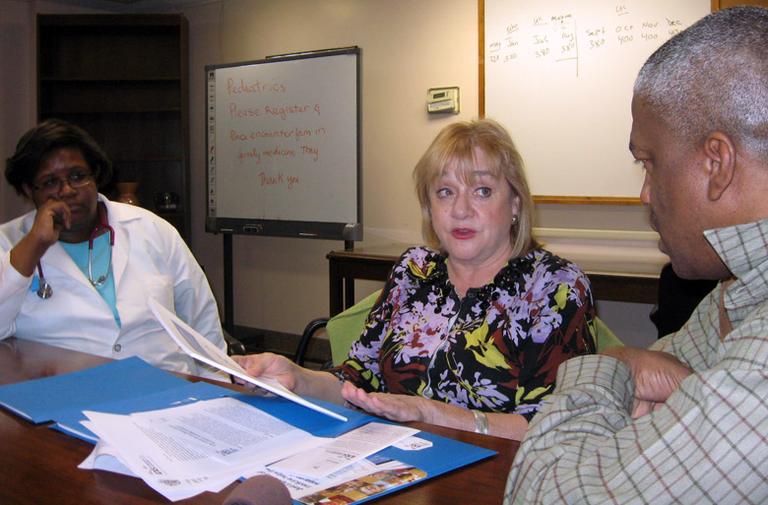Advertisement
Battling The Ex-Cheerleader Effect In Drug Marketing To Doctors
The pharmaceutical industry spends billions of dollars each year promoting its products. That means doctors often get a one-sided view of which drugs are best for their patients. Now, a new program in Massachusetts aims to give doctors bias-free medical information — but it might not be around for long.
Ever wonder how doctors decide which drugs to prescribe?
You might think it's a totally objective decision based on heavily researched medical data. But sales and marketing play a big role, too, as The Daily Show pointed out in one of its segments last year.

Doctor interviewed by Daily Show: "There's a real trend for the drug companies to use attractive people, often attractive women."
Daily Show reporter: "Oh really? Before she was Miss Florida 2006, Cristen Duran was a drug rep for First Horizon Pharmaceuticals."
Cristen's a good-looking recent college grad in a sexy pink sun dress. She has remarkable success selling drugs to doctors.
Cristen: "Doctor, nice to meet you. I just wanted to stop by today and offer you..."
Doctor: "Yes, I'll take it! Two! I'll take two of everything!"
You won't see that sales tactic at the Independent Drug Information Service, a nonprofit program started last year in Massachusetts. Its goal it to provide unbiased, up-to-date medical information.
Barbara Russell works for the program and she doesn't wear strappy sun dresses when she visits doctors' offices. She's a nurse with more than 30 years of experience.
On this day at the Harvard Street Neighborhood Health Center in Dorchester, she's scheduled an appointment to talk about diabetes treatment with the medical director, Dr. Stephenson Tobierre — but she doesn't start off by mentioning prescription medications at all.
Video: Academic Detailing On The Daily Show
Instead, she goes over all possible treatments for diabetics, including ones that don't involve drugs, such as diet, exercise and other lifestyle modifications.
Advertisement
Her data comes from a team of researchers at Harvard Medical School, not from a pharmaceutical company. And she gets technical fast.
"So what would your target A1C be for patients?" she asks Dr. Tobierre.
"Seven," he answers.
"Great," Russell responds. "And do you use the generic Metformin?"
"Yes, generic Metformin," Tobierre replies.
"OK," Russell says, "so far, we're doing great here."
Later, Tobierre says that even though he already knew a lot of this information, it's always helpful to reinforce his knowledge.
"Usually, if a drug rep comes in, you hear all the bad things about the other drugs and nothing bad about his drug, and they can bias you into prescribing their medication," Tobierre says. "So it's always good to hear from somebody who's supposedly neutral."
Dr. Jerry Avorn, a professor at Harvard Medical School, created this concept of medical information free of commercial interests.
"More and more, there's a suspicion — well-founded, often — on the part of a doctor of, 'Who's really bringing me this message?' " Avorn says.
"So when somebody comes to me and says, 'Let me talk to you about how to manage hypertension,' my first instinct — and I think that of most of the doctors we see — is, 'Who really sent you and what's their real agenda?' "
Avorn says his program gives the whole story. It doesn't just pitch Lipitor or Plavix or whatever medication commercial drug marketers are paid to promote.
"It is a bulwark against the sales reps coming in saying, 'Oh, well don't you know about that study that was in the Norwegian Journal of Diabetology in which our drug came out so much better?'" adds Avorn. "You know, there's always some weird, one-off study in some obscure journal that the sales reps can come in waving in your face."
But are doctors really so easily influenced by slick marketing?
John Heffernan of the Massachusetts Biotechnology Council says no.
"To think that doctors are being swayed one way or the other by sales pitches to use a certain product — I think the doctors should be outraged by that," he says.
Heffernan argues that Avorn's program is unnecessary because Massachusetts already has the strictest drug-marketing rules in the country.
"We're pretty confident that the right checks and balances are in place," Heffernan says. "So is this the right time to be spending the money on this unproven concept?"
But Avorn contends his program actually improves doctors' prescribing decisions. And he says it can save the health-care system money by eliminating unnecessary prescriptions.
Still, the Massachusetts program could vanish later this year. That's because it lost its funding in recent state budget cuts. Of course, that might not be much of a disappointment to The Daily Show.
When Avorn himself appeared on the show to talk about his program, he was asked about his staff and their marketing techniques:
Daily Show reporter: "What do you use — models, actresses?"
Avorn: "We use real nurses, real pharmacists, real people who know about health care."
Daily Show reporter: "Do you use sorority nurses?"
Avorn: "No."
Daily Show reporter: "Avorn wants incredibly hot ex-cheerleader drug reps out of the medical game."
Actually, Avorn says as long as those ex-cheerleaders have the same deep medical knowledge as the people he employs, he's happy to have them helping doctors decide which drugs are most safe, effective and affordable.
